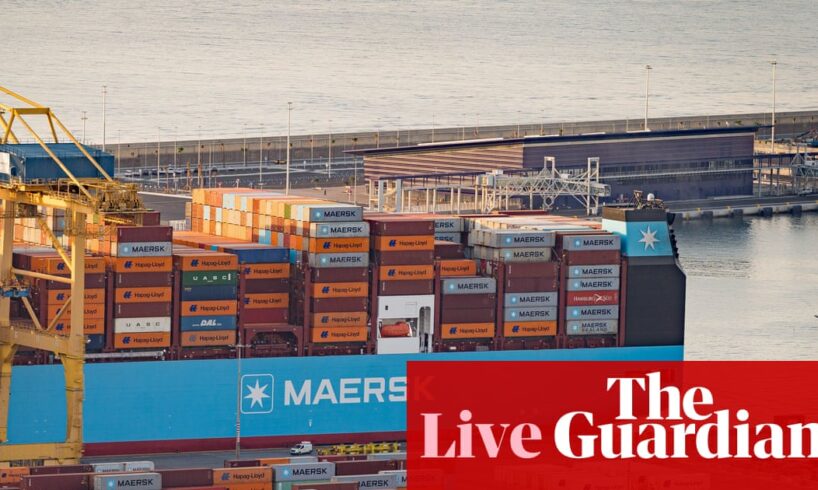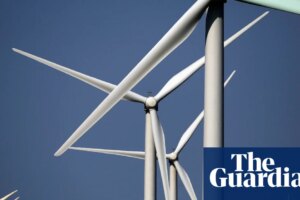
Closing summary: US seeks ‘escalation dominance’ even as tariffs hurt economy
The International Monetary Fund (IMF) is clear that the US tariffs on most trading partners will be harmful to global growth. One of the key questions is how the harms will be spread.
Pierre-Olivier Gourinchas, the IMF’s chief economist, said the tariffs will reduce activity and gradually it will also translate into higher prices in the US – even as he revealed a slightly higher growth forecast than expected.
Philip Luck, director of the economics programme at the Washington-based Center for Strategic and International Studies, said that the US has essentially aimed to convince other nations that it can take more pain – warding them off significant retaliation. He said:
This success in avoiding retaliation likely stems from credible signaling of “escalation dominance”—essentially convincing partners that entering a cycle of economic retaliation would be more costly for them than for the United States.
There are also more signs of discontent in the EU – which could feel particularly hard done by if other countries face a “world tariff” of 15%. That would be the same level that the EU agreed to much fanfare. Reuters reported:
German Economy Minister Katherina Reiche said on Tuesday that the European Union is currently negotiating with the United States from a position of weakness and emphasized the need for a change in approach.
The EU will closely measure the United States against the commitments made in Sunday’s tariff deal, Reiche said, adding that the new tariffs would bring an enormous burden.
Modupe Adegbembo, an economist at Jefferies, an investment bank, said the EU deal meant the worst-case scenario of 30–50% tariffs has been avoided.
While the agreed tariffs still represent a sharp increase from the pre-April average of just 1.2% to 17.5%, firms can now plan with greater confidence despite the higher costs. Over the longer term, however, this substantial rise in tariffs will materially increase the cost of US market access for EU exporters and may weigh on business sentiment.
Although the absolute cost of exporting to the US has risen, the EU’s relative competitiveness has improved. The new 15% baseline tariff is higher than the 10% faced by UK exporters, but remains more favorable than the 30% applied to Chinese goods and is on par with Japan’s 15%. This positioning could help cushion the impact on export volumes, even as firms adjust to the new trade environment.
In other business and economics news:
Barclays bank’s second quarter profits rose 28% to £2.5bn, beating consensus estimates for £2.2bn.
Donald Trump said the UK’s taxes on North Sea oil “make no sense” and called for incentivising production.
Stellantis, the maker of the Fiat, Jeep and Vauxhall car brands, has said that it expects a €1.5bn hit from tariffs this year.
Anglian Water has been ordered to pay £62.8m by the water regulator, Ofwat, over failures in managing its wastewater treatment works and network that meant it was unable to cope with sewage flows.
Trade talks between the US and China continued in Sweden, with an extension of a deadline likely, according to the Trump administration.
You can continue to follow our live coverage from around the world:
Thank you for following today again, and please do join me bright and early tomorrow. First up, eurozone GDP. JJ
Share
Key events
Show key events only
Please turn on JavaScript to use this feature
Wall Street has joined European markets by rising at the opening bell.
Here are the opening snaps, via Reuters:
S&P 500 UP 18.19 POINTS, OR 0.28%, AT 6,407.96
NASDAQ UP 117.75 POINTS, OR 0.56%, AT 21,296.34
DOW JONES UP 21.43 POINTS, OR 0.05%, AT 44,858.99
The FTSE 100 is now up by 0.7%, and has come within 15 points – a whisker – of setting a new record high.
Share
Donald Trump’s tariffs will raise inflationary pressure in the US and slow growth, according to Pierre-Olivier Gourinchas, the IMF’s chief economist.
This is not a surprising verdict from the IMF, but the warning on inflationary pressures in particular illustrates the dilemma for Jerome Powell at the Federal Reserve. Trump is trying to push Powell into cutting interest rates – despite also raising tariffs, a key reason Powell is holding firm.
Gourinchas said:
This is a negative supply shock for the US economy. It is going to reduce activity and gradually it will also translate into higher prices. We’re starting to see signs of these higher prices coming through… We expect that there will be stronger inflation pressures in the second half of the year and lower activity.
SharePierre-Olivier Gourinchas, now chief economist of the International Monetary Fund, speaks at a news conference during the World Bank/IMF Spring Meetings at the IMF headquarters in Washington, in April 2023. Photograph: José Luis Magaña/AP
Pierre-Olivier Gourinchas, the IMF’s chief economist, is speaking at the Washington press conference announcing the organisation’s new world economic outlook. He did not name him, but there was one target for many of the messages: Donald Trump.
Gourinchas called for an end to the trade war:
Restoring stability in trade policy is essential to reduce policy uncertainty. We urge all parties to settle trade disputes and agree on clear and predictable frameworks. Collective efforts should be made to restore and improve the global trading system.
He also gave a blunt defence of central bank independence – after Trump’s repeated criticisms of Federal Reserve chair Jerome Powell. Trump wants Powell to lower interest rates.
Gourinchas said:
It is important to reaffirm and preserve the principle of central bank independence. The evidence is overwhelming that independent central banks, with a narrow mandate to pursue price and economic stability, are essential to anchoring inflation expectations. That central banks around the world achieved a successful ‘soft landing’ despite the recent surge in inflation owes a great deal to their independence and hard-earned credibility.
He also said that recent trade deals are essentially covered by the IMF forecasts, because they lock in relatively high tariffs, such as 15% on EU exports to the US. He said:
We are not seeing a major change on the effective tariff rate on other countries.
It might be a little bit above, a little bit below, but it won’t be very different.
Share
Global economy to grow by 3% in 2025 says IMF
The International Monetary Fund (IMF) has upgraded its forecast for global economic growth this year after the US retreated from some of its most extreme tariff measures.
The Washington-based fund predicted global growth in 2025 will be 3%, up from an estimate in April of 2.8%. The outlook for 2026 was upgraded from 3% to 3.1%. The global economy grew by 3.3% in 2024.
The Guardian’s Phillip Inman reports:
The Washington-based organisation said a “de-escalation in tariffs” by the White House spurred a recovery in global trade and a broader economic expansion, though US policies remain “highly uncertain” and risks to growth remain “firmly on the downside”.
Most regions benefited from the more benign economic outlook, including the UK, which is expected to grow by 1.2% this year – 0.1 percentage points higher than in the IMF’s April outlook [although this was already revealed in May].
In April, Donald Trump threatened to impose severe import tariffs on the world’s biggest exporters of goods, including the UK, EU, China and South Korea, to combat what the US president believed was unfair competition.
Stock markets dived and the US dollar fell as investors, spooked by the potential hit to world trade, bought safe havens assets.
The US later delayed or reduced tariffs in return for commitments to purchase US-made goods, reversing market falls as investors concluded Trump Always Chickens Out – or Taco for short.
A chart showing the IMF’s growth forecasts for different countries.
You can read the full report here:
ShareGames Workshop owns the Warhammer game, played with miniature figurines. Photograph: Ton Koene/Alamy
The FTSE 100 is up 0.5% at lunchtime in London – and was earlier just 20 points shy of its record high.
Two-thirds of the index constituents are up today, but the stand-out performer is Games Workshop, the maker of Warhammer game figurines. Its share price has risen 6.7% today after it upped its dividend and reported stronger-than-expected pre-tax profits for the year, up 29.5% to £262.8m.
But it was not all good news: they highlighted a £12m cost from Donald Trump’s tariffs and – err, somewhat unusually – the presence of a single bat blocking development of one of its car parks. Rachel Reeves would be appalled.
Games Workshop (genuinely) said in its annual results that things were mostly “solid”, but:
The exception was the news about tariffs and the cute looking pipistrelle bat that is delaying our work on our new temporary car park. We are carefully looking after the bat and we hope the uncertainty around tariffs is resolved soon. We are also mindful of the increased risk of supply chain disruption as a direct consequence of conflicts around the world, which we highlight as a principal risk.
A flying Pipistrelle bat in a forest – one of the breed that has so troubled FTSE 100 company Games Workshop. Photograph: Rudmer Zwerver/AlamyShare
Updated at 14.38 CEST
Boeing 737 MAX airplanes are shown on the assembly line during a media tour at the Boeing facility in Renton, Washington in 2024. Photograph: Jennifer Buchanan/AP
Boeing narrowed its losses in the second quarter of 2025 as America’s planemaking champion increased the rate of production of its bestselling 737 Max.
The Seattle-based company reported a net loss of $612m between April and June, compared with a $1.4bn loss in the same period last year.
The manufacturer is trying to turn itself around after years of crisis triggered by two fatal crashes of the 737 Max, followed by the coronavirus pandemic and a mid-air door panel blow-out last year that reignited controversy around the company’s safety record.
The company is now producing 38 737 Max planes each month. Europe’s Airbus, Boeing’s bitter rival, is aiming to produce 75 of its A320 planes a month.
Kelly Ortberg, Boeing’s chief executive, said:
Our fundamental changes to strengthen safety and quality are producing improved results as we stabilise our operations and deliver higher-quality airplanes, products and services to our customers.
As we look to the second half of the year, we remain focused on restoring trust and making continued progress in our recovery while operating in a dynamic global environment.
Boeing booked 625 net orders of new aircraft after cancellations and conversions.
Share
Tariffs will cost Stellantis €1.5bn in 2025
A Stellantis assembly worker walks between two 2021 Jeep Grand Cherokee L vehicles on the assembly line at the Detroit Assembly Complex in Michigan in 2021. Photograph: Rebecca Cook/Reuters
The maker of the Fiat, Jeep and Vauxhall car brands has said that it expects a €1.5bn hit from tariffs this year.
Stellantis, the world’s fifth-largest carmaker by sales, combines operations in France, Italy and Detroit (as well as a smaller operation in the UK producing vans), making it vulnerable to changes in trade conditions.
It said the 2025 net tariff impact would be approximately €1.5bn, of which only €300m was incurred in the first half of the year.
The company is trying to recover from a sales slump – particularly in the US – that resulted in the ousting of former chief executive Carlos Tavares. He was replaced by Antonio Filosa, a company veteran. Filosa said:
2025 is turning out to be a tough year, but also one of gradual improvement. Signs of progress are evident when comparing H1 2025 to H2 2024, in the form of improved volumes, Net revenues, and adjusted operating income, despite intensifying external headwinds.
Our new leadership team, while realistic about the challenges, will continue making the tough decisions needed to re-establish profitable growth and significantly improved results.
Stellantis’s shares fell by 1.9% on Tuesday.
Share
Consumer goods maker Procter & Gamble has reported that tariffs took a bite out of its profit margins in the last quarter.
P&G reports that its gross margin in April-June fell by 50 basis points compared with the same quarter a year ago.
It explains:
The decrease was driven by 150 basis points of unfavorable product mix, 70 basis points of product/package reinvestments, 40 basis points of higher commodity costs, 40 basis points of higher costs from tariffs and 40 basis points of other miscellaneous items and rounding.
But this squeeze on profits was partly offset by 240 basis points of productivity savings, while higher prices added 50 basis points to profit margins.
P&G, whose brands include Pantene, Head & Shoulders, Pampers, Ariel and Fairy, also reported that net sales were flat over the last year.
Share
Think tank: Trump tariffs will raise the cost of food for Americans
Graeme Wearden
Americans have been warned that Donald Trump’s tariffs are likely to lead to higher food prices in the shops.
New analysis from the Tax Foundation, a think tank, shows that it will not be possible for US retailers to switch to domestic producers to replace an imported product once it incurs a higher tariff.
They cite bananas, which the US has “a limited ability to produce” and “Brazilian coffee”, which US producers cannot simply make.
Tax Foundation explain:
In 2024, the US imported about $221 billion in food products, 74 percent of which ($163 billion) faced the Trump tariffs. While these imports currently face tariff rates ranging from 10 percent to 30 percent, they will exceed 30 percent for some countries if the reciprocal tariffs go into effect on August 1.
The top five exporters of food products to the US, in order, are Mexico, Canada, the EU, Brazil, and China, accounting for 62 percent of total US food imports.
Share
Updated at 13.05 CEST
Donald Trump’s call for lower taxes on North Sea oil was based on the idea that it would be a “treasure chest” for the UK. That is strongly disputed in some quarters.
There is little doubt that there is money to be made for oil companies – although much less than in the North Sea’s heyday – the idea that it would cut energy prices is questionable. Oil is a global market, so it is unlikely that the relatively small amounts left in the North Sea would impact prices. Another option would be to force the oil to be kept in the UK at a lower price – but that would represent nearly unprecedented state control of the industry.
James Alexander, chief executive of UK Sustainable Investment and Finance (UKSIF), a lobby group for green investors, said:
Investors have repeatedly expressed their desire to support the UK’s clean energy transition, provided the right policy framework and signals are in place.
Expanding drilling will have no impact on energy bills, as crude oil is bought and sold at international prices. It would also undermine the UK’s green credentials with investors, which risks driving investment, growth and jobs out of our country.
The idea that North Sea oil is an untapped ‘treasure’ is just another false myth told about our heavily depleted reserves.
ShareChinese vice premier He Lifeng arrives at Rosenbad, Sweden, ahead of the second day of trade talks between the US and China on Tuesday. Photograph: Fredrik Sandberg/TT/Reuters
US and Chinese officials have arrived in Sweden for the second day of trade talks in an effort to avert a return to huge tariffs on Chinese goods on 12 August.
Pictures from Sweden show the Chinese delegation led by vice premier He Lifeng arriving on Tuesday.
Share
Source





